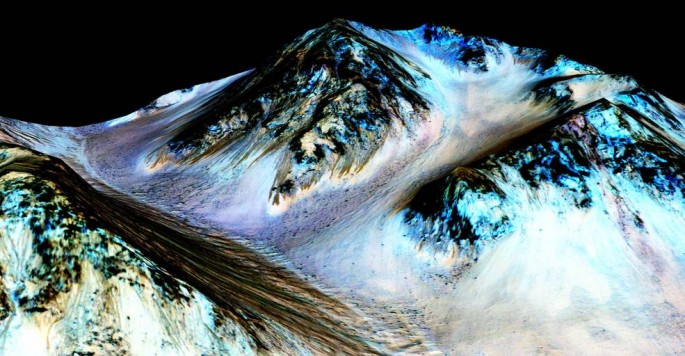NASA scientists just revealed the existence of odd mineral salts that are apparently abundant on Mars known as perchlorate. However, scientists believe that they could possess both beneficial and harmful effects on humans.
Perchlorate's benefits encourage the breaking down process to release oxygen on the Red Planet that can help humans to explore and colonize Mars. Apart from this, it is also a rocky propellant for spacecraft that can allow water to exist despite limited pressure from Martian tenuous atmospheric conditions.
Perchlorate was first detected by NASA's Phoenix lander in 2009 and last year, the Mars Reconnaissance Orbiter detected massive amounts of the salt on the surface of the alien world from a waterflow known as recurring slope linae proving the existence of water on the otherwise, dusty, arid planet. Studies also show how perchlorate is around 10,000 times more abundant on Mars than any other sand or soils, but despite its beneficial and useful properties, it can also pose some threats to human health.
Exposure to these salts, can also encourage an underactive thyroid and develop into hyperthyroidism since ClO4- is a negative ion. This condition is caused by the thyroid gland which over produces a hormone called thyroxine which can accelerate metabolism that can lead to sudden weight loss, irregular heart rates, extreme sweating and nervousness and significant irritability.
Perchlorate is also responsible for flowing water on Mars even though it is toxic in nature. In comparison to Antarctica's Don Juan Pond which possesses 44 percent salinity, surface water on Mars is so salty, that is almost similar to brine. This also suggests that water on Mars cannot support microbial life which can also cause dangerous life threatening diseases like agranulocytosis that is caused by extreme lack of white blood cells and aplastic anemia that causes a depletion of all blood cell types due to failure of bone marrow development. Perchlorate is also toxic for lactating mothers and babies as well.
New findings about perchlorate can significantly change the approach colonizing Mars for a potential second home for humans, as further studies are required to assess the potential health hazards and threats on Mars.



























